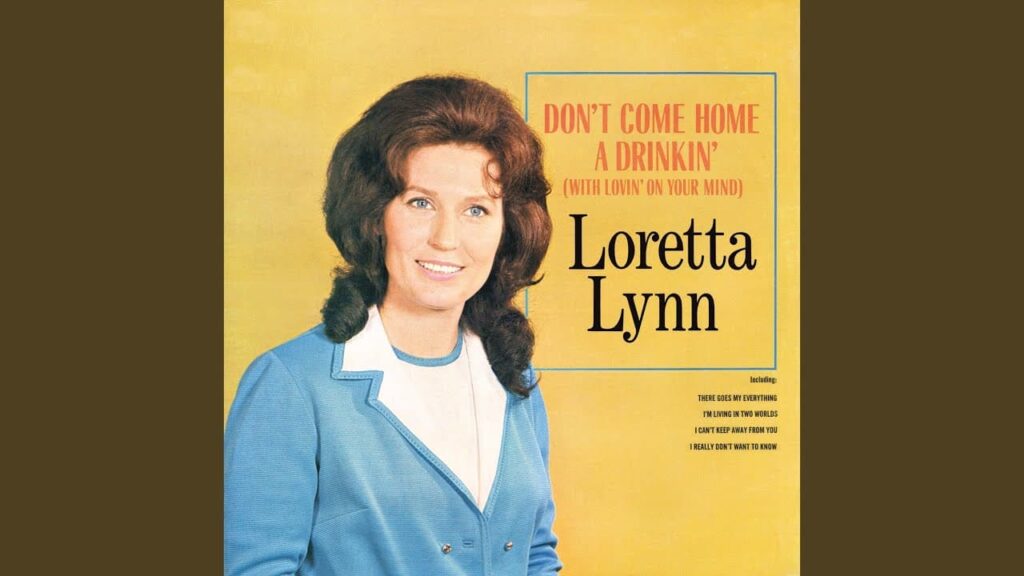
A Bold Warning and a Woman’s Pride — Don’t Come Home A-Drinkin’ (With Lovin’ on Your Mind)
When Loretta Lynn shouted out, “Don’t come home a-drinkin’ with lovin’ on your mind,” she gave voice to honest frustration and unapologetic strength in a way few women of her time dared.
Born out of real life turmoil and fierce love, “Don’t Come Home A-Drinkin’ (With Lovin’ on Your Mind)” became a landmark moment in country music for Loretta Lynn: it was her very first – and hard-won – No. 1 hit on the U.S. Billboard Hot Country Singles chart. Released in November 1966, it climbed to the top in early 1967, firmly establishing Loretta not just as a singer, but as a storyteller unafraid to bring her own life into her music.
From the very first notes, the song feels like a conversation between a weary but resolute heart and a man who has lost his way. Written by Loretta Lynn herself, in collaboration with her sister Peggy Sue, the lyrics are not fictional fantasy—they’re rooted in her lived experience. Loretta’s husband, Doolittle (“Doo”), was known to be a heavy drinker, and she channeled her frustration, her sorrow, and her strength into this bold declaration: she points out the mismatch between the bottle and the body, between late nights with friends and early mornings with her hurt and pride.
She recorded the song on October 5, 1966, at Bradley’s Barn in Mount Juliet, Tennessee, under the watchful production of Owen Bradley, a name that appears often in the golden era of country. The background vocals — carried by The Jordanaires — add a gentle but insistent chorus of empathy, as if the world around her also hears the pain behind her words.
The boldness of the song lies not only in its message, but also in its timing. In 1967, it was still uncommon for a woman to write and sing so directly about her anger, her dignity, and the rawness of her married life. Yet Loretta did exactly that — and country radio listened. When the single hit No. 1, she became only the seventh solo female vocalist ever to reach that summit at the time.
The song’s success also gave birth to a namesake album, Don’t Come Home A-Drinkin’ (With Lovin’ on Your Mind), released in February 1967. That album went on to become the first by a female country artist to be certified Gold by the RIAA — testament to how deeply Loretta’s voice resonated with people, especially other women living through similar struggles.
But more than commercial triumph, the song had meaning. It was a declaration: a woman demanding respect and honesty, refusing to be second to a bottle. It wasn’t just a reprimand to her husband—it was a mirror held up to anyone who had ignored her voice. The humor in her delivery doesn’t soften the blow; instead, it makes the message all the more cutting: liquor and love, she sang, they “just don’t mix.”
Loretta later explained that she wasn’t trying to shame anybody, but simply to speak her truth. That authenticity turned her into a powerful symbol for women in country music—and beyond.
In the years that followed, she would keep writing such deeply personal songs — songs that addressed everything from marital pain to birth control. But Don’t Come Home A-Drinkin’ stands out because it was the moment she asserted herself fiercely, knowing she might ruffle feathers — and yet doing so anyway.
Decades later, the song remains one of her most beloved. It’s been covered, reimagined, and honored, but whenever you hear those opening lines, you can almost feel Loretta’s fire, her heartache, and her unyielding dignity. It’s a song that echoes through time, reminding us that honesty and strength often walk hand in hand — and that sometimes the bravest thing you can do is tell someone, “Don’t come home like that.”